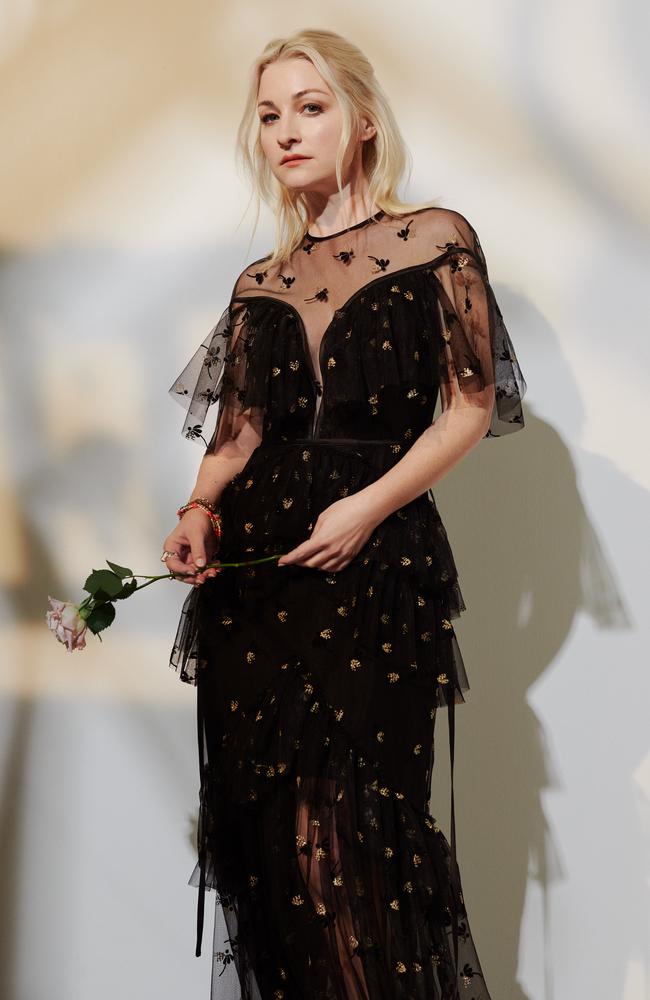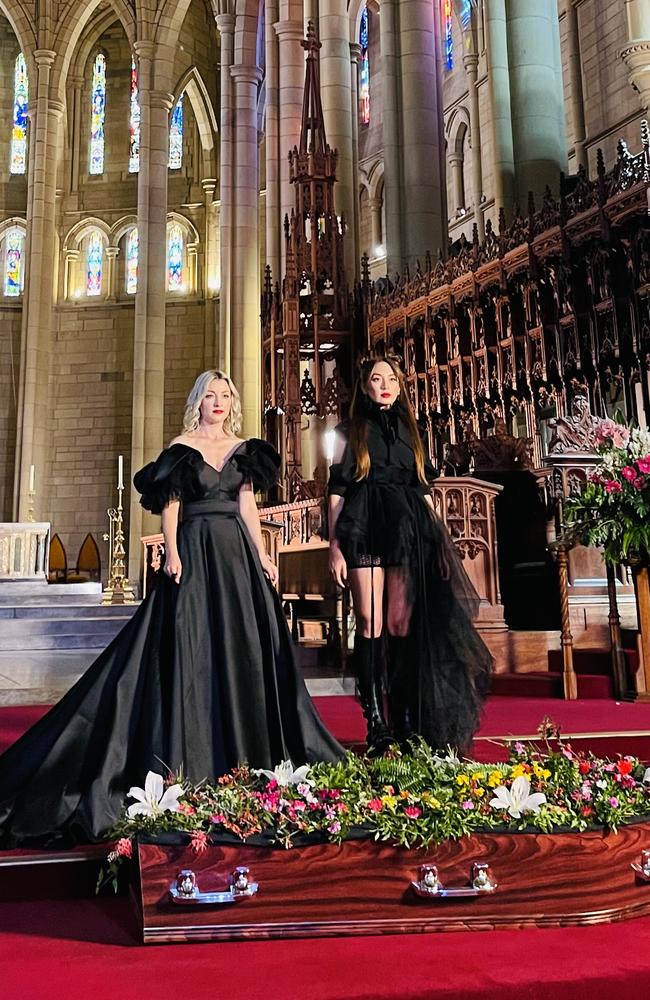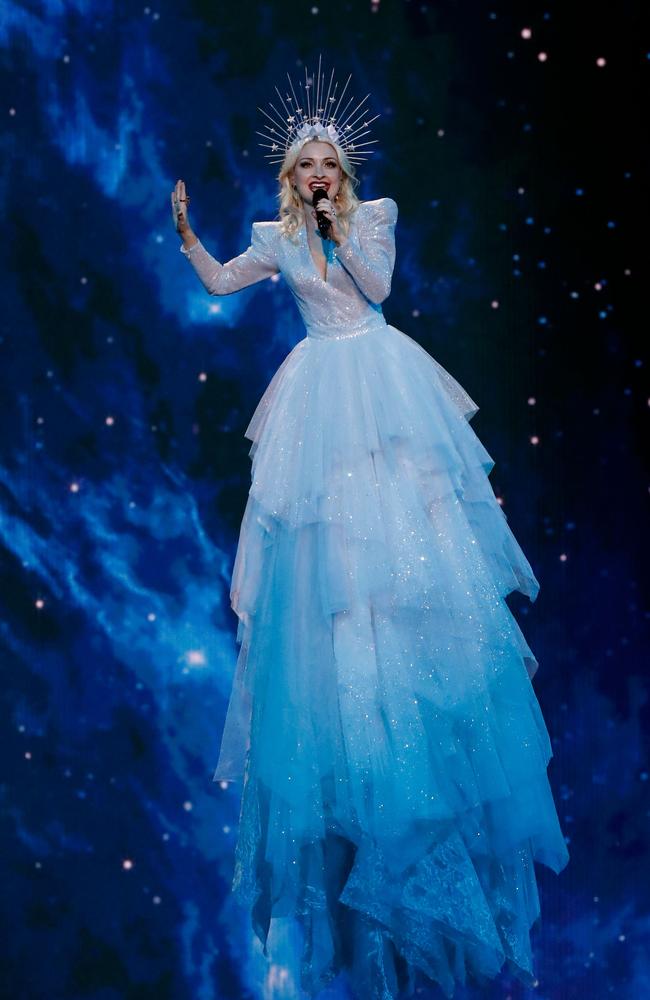‘Our secret’: How Kate Miller-Heidke found the courage to expose pedophile great grandfather
Kate Miller Heidke’s great grandfather knew exactly what to say to ensure his “secret” was kept. This is her extraordinary story about exposing him for what he truly was, first to her family at 11 and to the world through a powerful song.
News
Don't miss out on the headlines from News. Followed categories will be added to My News.
As a child growing up in the Brisbane suburbs, Kate Miller-Heidke was obsessed with TV soap Home And Away, as many children were in the early ’90s.
But one night when she was 11, sitting down to the show, a plot unfolded that she hadn’t seen before. Not outside her own life. It niggled at her.
Because even at 11 she had a dark secret, entrusted to her by a grown-up since she was four, and she had obediently kept it between them – as children, in their innocence, try their best to do when it comes to grown-ups.
But the burden of the secret, the one thing her mother, Jenny Miller, didn’t know about her daughter, had begun to feel enormously heavy.
“There was a plot line on Home and Away about someone who was abused by a paedophile and then got the courage to tell their parents,” Miller-Heidke says, offering a small laugh at the slight absurdity of something so large coming from a TV soap.
“I just went to my room and cried all night and then finally got the guts to tell my mum what had happened.”
Miller-Heidke was sexually abused by her great-grandfather Archibald Barnes, a serial paedophile, for three years between the ages of four and six, which only stopped when she resisted going to bedrooms with him alone.

She never saw him again after she told her mother, who, with all her might, relieved the weight from her daughter’s shoulders.
But the freedom from Barnes’ grip didn’t come until he died when Miller-Heidke was 20, and training in classical voice.
Now a mother herself to son Ernie, Miller-Heidke began to write her fifth studio album, Child in Reverse, about childhood in 2019, and the old wounds from her own life at the same age rose to the surface, and out flowed a song about Barnes’s death.
You Can’t Hurt Me Anymore was such a powerful song she decided to re-record it as a collaboration with fellow abuse survivor Jaguar Jonze, real name Deena Lynch, in late 2021 and release it as a single on March 9.
Her record label, EMI Music, asked for a blurb about the song a few weeks before its release — a routine request —and initially she tried to cushion the truth in vague language such as “dancing on the grave of an arsehole”.
But with the voices of trailblazing activists Grace Tame, Brittany Higgins and Jonze circling her mind, she thought simply to herself: “F--k it”.
“My latest album Child in Reverse is about childhood,” wrote the highly acclaimed musician, in a media release on March 10.
“I was sexually abused by my great- grandfather Archibald Barnes. He was a paedophile and a serial offender. I wasn’t the first or the last. Although obviously my family didn’t know it at the time, and didn’t find out until some years later. This song is about how I felt when he died. Ultimately, it’s a really empowering song to sing.”
Less than a week after Miller-Heidke’sstatement was released, she meets me in a cosy bar in inner Brisbane.
After many years living in Melbourne, Miller-Heidke and husband Keir Nuttall – who she met while they were studying at the Queensland Conservatorium of Music – moved back to their hometown with their son Ernie, 5, in 2021 amid the chaos of the global pandemic.
As we order a glass of red, she chats about her recent gig in the Yarra Valley wine region. She had performed her new music for the first time as part of the Wildflower tour, a union of female musicians supporting each other.
“It just felt amazing,” she says. “It was a little bit emotional but it is just that live connection with people, it’s almost magical, it’s very powerful.”
She had never in her two decades of life in the public eye contemplated sharing her story of abuse, having only ever told those in her close circle.
But when contemplating how to skirt the truth in a media statement, the idea of lying pulled at her harshly.
“I felt the song had this power and I loved the version with Deena, Jaguar Jonze,” she says.
“I never felt that I wanted that sort of platform for myself. I know that sexual abuse is incredibly common … and I didn’t feel compelled to put my story out there in that way, but because I had to put the song into some sort of context, any other version would have been inauthentic for me.

“I thought, I’ll just write what it was truly about. It’s the only thing that feels real to me right now, and especially after having just seen the examples of Grace Tame and Brittany Higgins, and what’s going on in the zeitgeist at the moment, it didn’t feel that extreme to be doing it, actually. It did feel a bit cathartic.”
Abuse within a family is emotional and divisive and, despite being an unfair burden to keep, Miller-Heidke would never have shared the story while her maternal grandmother, who died recently, was alive, sparing her that hurt.
She spoke to her husband first, who not only supported the decision but encouraged her to name her abuser and then she nervously asked her mother, not certain how she would react.
“She said, ‘yep do it, he was a c--t’,” she recalls, smiling without a hint of hesitation over the word.
“That actually meant a lot, to hear that. Telling my mother (about the abuse) was a huge turning point for me because I didn’t have to shoulder this burden on my own anymore,” she continues. “And so if watching Home and Away can do that to an 11-year-old kid I think just having people’s stories out there, it does make a difference.”
Since revealing the abuse, Miller-Heidke has been overwhelmed by the positive response and reaction to the song.
She was also inundated with messages from people who had experienced similar abuse and others who revealed incidents with Barnes she did not previously know about.
He was never charged but someone in Tasmania, where he lived, is now researching what they can about him, which she says has been “incredibly shocking”.
“I’ve heard from so many people who have said that it means something to them because of their experiences and that they would feel a little bit more courage to maybe share their stories with their family,” Miller-Heidke says.
“It made me reflect on what happened with me, which is that I was told to keep it a secret – which of course I obediently did for many years.
“And I remember feeling as a young child that I had this enormous weight on my shoulders, this secret that I couldn’t tell my mother and this invisible wall between my mother and I; the only thing she didn’t really know about me.”

Miller-Heidke’s mother Jenny Miller was aballet dancer and then a teacher and her father, Greg Heidke, was a high school principal.
They separated when Miller-Heidke was young and she was raised between their two homes in Brisbane, alongside her younger brother, David, and older stepbrother, Paul.
Her great-grandfather Barnes lived in Tasmania but the family would regularly visit him there or he would visit them in Queensland.
From the age of four, Barnes would take Miller-Heidke away alone, always into a bedroom, and show her pornography, he had a set of naked playing cards, before forcing her into oral sex. She was abused three or four times a year up until she was about seven.
“I remember it really vividly and I never, ever forgot,” Miller-Heidke says, speaking calmly but purposefully. “It wasn’t his first time. He was well practised at grooming kids …”
“It was our secret that I had to keep,” she continues. “I think he just said, ‘don’t tell anyone about this, it’s our secret’.”
Miller-Heidke kept their secret but as she grew older, she began to feel uneasy about her interactions with Barnes. “I realised something didn’t feel right and the burden of his secret just started to weigh more heavily and that’s when I sort of got old enough, at the age of seven, to sort of not put myself in that position anymore – not letting myself go into a room with him,” she explains.
After finally telling her mother when she was 11, Miller-Heidke was shielded from what happened next, her mother confronting the family head-on.
“She was really upset obviously and made contact with my great-grandfather who was still alive at the time. We never saw him again after that,” she explains, saying they discovered not long after that he was a serial paedophile.
“It did come out that I wasn’t the only person in the family who this had happened to, and everybody knew, you know – everyone knew – and he also did it to people outside of the family.”
Her family did not report the rape to the police, which Miller-Heidke believes is another unfair burden for a victim to carry.

“It is upsetting and my mum and I have a great relationship, but I know that these sorts of things can split families apart,” she says.
“Which in a way is unfair because the victim shouldn’t have to take on that guilt as well, but that’s just part of that shroud of secrecy and … people’s obligations within families to not rock the boat and not shame the family. This was the early ’90s – it just wasn’t done.
“I guess that’s one thing that’s different about these times now … women standing up for themselves, I think the world is getting better.”
There is no reliable data about the extent of child sexual abuse in Australia because the majority of victims and survivors don’t report their experiences to police.
According to the 2016 Australian Bureau of Statistics Personal Safety Survey, 1.4 million adults living in Australia at that time had experienced sexual abuse before the age of 15, most commonly committed by someone known to them.
When I ask Miller-Heidke what she thinks when she remembers Barnes, she pauses.
“It’s a lot of mixed feelings,” she responds. “In some ways there’s a level of grief for a relationship that could have been so different.
“He was a deviant and a criminal and I think there are so many crimes you can have empathy for, or even imagine yourself doing under certain circumstances, but doing that to a child, you’ve got to cross this line that I think makes you more irredeemable than just about any other crime I can imagine.”
While she doesn’t remember how she found out Barnes had died, Miller-Heidke vividly remembers how she felt “just relief that he was in the grave” and a “feeling of freedom”.
Musically gifted, Miler-Heidke wrote thousands of songs as a teenager, her first when she was just 10 and after school completed a Bachelor of Music in Classical Voice.
“Do you want to hear it?” she asks of her first song. She then effortlessly launches into a song about staring out over the water during a trip to Quebec, Canada, “only it’s ice now”, sending her recognisably ethereal voice floating across the bar.
“I never had any issues performing in front of people,” she continues with a laugh. “My son is the same which makes me worried.”
Over two decades Miller-Heidke established a varied career across music, stage and film, with 17 ARIA Award nominations, five studio albums and performances at the New York Metropolitan Opera, and Eurovision in Israel, during which she finished ninth for Australia in 2019. She and Nuttall, who she married in November, 2007, co-wrote the music and lyrics for the musical theatre version of Muriel’s Wedding, for which they won the Helpmann Award in 2018 for best original score, Miller-Heidke’s fifth Helpmann.
Her music and creative success did, she admits, in some way grow from the emotional labyrinth she found herself in as a young child.
“I had a few other fertile sources of misery as a child and those are the things that probably did turn me into a songwriter because I felt that I had something to say. I had this tangle of feelings that needed to find expression.
“I’m not saying I’m grateful for the experience at all but it’s part of why this (new) song is quite potent, it’s taking this old piece of shame and something hidden and exposing it to the light.”

Miller-Heidke attended an APRA song hub on the Gold Coast in 2019 and her old wounds were alive in her mind as she sat down with Lynch, who was also at the camp, for coffee before a songwriting session. Lynch has been open about the abuse and post-traumatic stress she suffered as a child, and has become a proud champion of the Me Too movement in the Australian music industry, publicly alleging she was sexually assaulted by two music producers, which she reported. In 2021 Lynch released the scathing track Who Died And Made You King?, which calls out local music industry bosses for failing to guard against a toxic culture in another example of the unifying power of music.
But chatting over coffee with Miller-Heidke in 2019, Lynch simply shared her story and Miller-Heidke confided in her in return.
“I was just in admiration of her strength and her resilience and it made me reflect on my own abuser,” she says. “Then the song just kind of came out that day … almost in one hit.”
The lyrics she wrote reflect the moment his death set her free.
I’ve been haunted by you lately, ever since I heard the news, memories that won’t ever leave me, all roads leading back to you... I called out to the stars, wished for you to cry; I called out to the moon, wished for you to die; I called out to the spheres, they did not hear me cry. I guess this is goodbye, I hold my head up high. You can’t hurt me anymore.
As the women’s movement gained momentum through the likes of Tame and Higgins, Miller-Heidke reached out to Lynch at the end last year of to re-record You Can’t Hurt Me Anymore as a collaboration.
For Lynch, who has felt the heavy toll of her advocacy, it was incredibly uplifting.

“After my experiences of childhood abuse, I’ve always had to find optimism in the pain, choose resilience and find a sense of purpose …” Lynch, 30, says.
“It helped me define a path for my own life, claim my power back from the people who abused me, and resist crumbling into the darkness.
“To have inspired someone as amazing as Kate to open up about her own experiences of abuse makes the pain worth it. Not only does it remind me to keep fighting, it showcases the true power of what can happen when we share our stories.”
The pair connected with Brisbane filmmaker Josh Tate, tasking him an admittedly impossible assignment of sensitively creating a fitting music video that told both of their stories.
Tate heartbreakingly was emotionally and physically abused by his mother throughout his child. She is deaf and they communicated only through AUSLAN. In a beautiful merger of all three of their stories, he created AUSLAN choreography to accompany the video.
“For me it was just so important,” Miller-Heidke says, exceedingly proud of the finished product. “It’s a really powerful song”.
Miller-Heidke is getting ready to tour Child In Reverse across Australia, and says it’s a relief after the pandemic being able to perform.
“For me it’s almost like breathing. It’s been a part of my life since I was a teenager. It’s like church,” she says.
Her brother is in Brisbane too, Ernie has a host of cousins to play with, and she is close with her mother, who now lives in Melbourne. She doesn’t identify as being a victim and shudders at being called a survivor.
“I never thought of it as something that defines me and it’s not something I still feel traumatised or particularly haunted by. I’m a pretty strong person. It doesn’t loom large for me. But it’s definitely there and it’s part of what made me who I am.”
She is many things; a singer, songwriter, wife, mother, daughter and an influential public figure, intended or not, who had the courage to tell her story, first to her mother at 11 and now to the world as a 40-year-old woman. And so she has in every way survived. Wonderfully.
CHILD IN REVERSE TOUR featuring Emily Wurramara. Visit frontiertouring.com/katemillerheidke
More Coverage
Originally published as ‘Our secret’: How Kate Miller-Heidke found the courage to expose pedophile great grandfather




